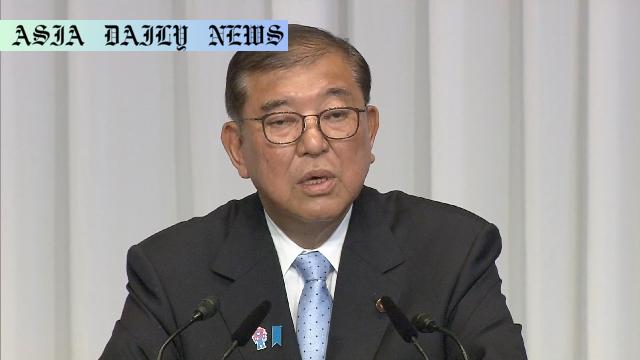Ishiba faces mounting pressure as LDP lost Upper House control.
- Japanese PM Ishiba pledges to stay despite LDP’s loss in Upper House.
- LDP members demand Ishiba’s resignation, citing weak leadership.
- The ruling coalition lost its majority for the first time in 70 years.
- Discussions with opposition parties are underway to gain consensus.
- Upcoming LDP meeting will attempt to solidify party unity and leadership.

Introduction: Unprecedented Challenges for PM Ishiba
Japanese Prime Minister Ishiba Shigeru faces a critical juncture in his leadership after the ruling coalition lost its majority in the Upper House—a significant shift that has sent shockwaves through his party, the Liberal Democratic Party (LDP). This setback marks the first time in the party’s 70-year history where it leads a coalition without majority control in either house of the National Diet. The election results have not only triggered internal criticism but have also intensified calls for him to relinquish his role as party leader.
An Uneasy Political Landscape
The ruling coalition, consisting of the LDP and its partner Komeito, won only 47 seats out of the 50 needed to maintain a majority. This limited political leverage makes governing far more difficult, especially amid ongoing sensitive negotiations on tariffs with the United States. Ishiba’s pledge to steer his party through this tumultuous period has drawn skepticism from within the LDP. Several lawmakers and party chapters have outright demanded his resignation, citing concerns that under his leadership, the government may not be able to navigate these challenges effectively.
A Divided Party at a Tipping Point
The election results have created fractures within the LDP, with notable figures voicing their dissatisfaction. Upper House lawmaker Aoyama Shigeharu has openly criticized Ishiba, labeling his administration as a “lame-duck government” unfit to lead critical discussions with foreign powers. Former Economic Security Minister Kobayashi Takayuki, while urging restraint in internal party conflict, also emphasized the need for Ishiba to take accountability. Such voices reflect the party’s struggle to find direction and unity in the face of mounting political and administrative challenges.
Efforts to Rebuild Amid Growing Pressure
Despite the backlash, Ishiba remains steadfast in his resolve. In a press conference shortly after the election, he highlighted the importance of the LDP retaining its role as a stabilizing force in the Upper House. Ishiba acknowledged the uphill battle ahead, expressing his intention to engage opposition parties to forge consensus on key policies. However, this conciliatory approach may not suffice to quell internal dissent. The upcoming LDP meeting, where party executives will seek to rally lawmakers from both chambers in support of Ishiba’s leadership, will be pivotal in determining the future direction of both the party and its leader.
Conclusion: A Leadership in Jeopardy
As Japan navigates complex economic negotiations and domestic policy challenges, the question of leadership is of paramount importance. Ishiba’s commitment to staying in office despite losing the coalition majority underscores the precariousness of his position. While some within the LDP aim to rebuild and coalesce around shared goals, others see Ishiba as a liability in these uncertain times. The political developments in the coming weeks will reveal whether Ishiba can muster the necessary support to govern effectively or whether the cracks in his party’s foundation will lead to a leadership change. Either way, the road ahead will shape not just his legacy but also Japan’s political trajectory.



Commentary
A Leadership Under Siege
Prime Minister Ishiba Shigeru stands at a crossroads in his political career, with his leadership being tested in unprecedented ways. Losing a majority in the Upper House for the first time in the 70-year history of the LDP is a bitter pill to swallow, not just for Ishiba but for his entire ruling coalition. The criticism he faces from within his own party reflects a deeper dissatisfaction with his ability to lead during a pivotal moment for Japan.
Internal Ripples and Rising Dissent
The calls for Ishiba’s resignation from prominent members of the LDP, such as Aoyama Shigeharu and former minister Kobayashi Takayuki, underscore how divided the party has become. Their dissatisfaction signals a growing concern over Ishiba’s ability to manage critical issues, including ongoing tariff negotiations with the United States. While dissent is not unusual in politics, it is a glaring issue when internal party conflict jeopardizes a government’s ability to function cohesively. For Ishiba, the challenge lies not only in governing but also in earning the trust and respect of his own party members.
The Broader Implications for Japan
Beyond the LDP, this political crisis has important implications for Japan as a whole. The loss of majority control in the Upper House complicates legislative processes and increases reliance on opposition parties. Ishiba’s pledge to govern through consensus-building may sound noble, but it is an arduous path fraught with potential deadlocks. In such a fragile political environment, achieving progress on key issues—be it economic policy, foreign relations, or domestic reforms—becomes exceedingly difficult.
Conclusion: A Moment of Reflection
As Ishiba navigates these treacherous waters, he must evaluate whether his continued leadership serves the best interests of both his party and the nation. At the same time, members of the LDP must decide whether unity or a change in leadership is the better path forward. In politics, moments like these define legacies and shape the future. For Ishiba and the LDP, this is no exception. The coming weeks and months will put their resilience and foresight to the ultimate test.